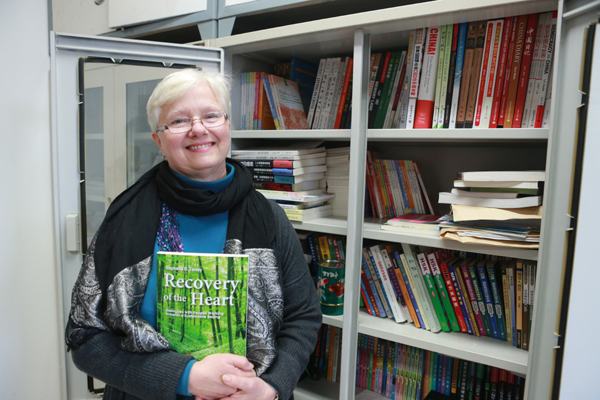 |
|
Stephanie Tansey believes dialogue is about creating an open space and she unveils the power of dialogue in her new book Recovery of the Heart. Feng Yongbin/China Daily |
Got a tale to tell about environmental issues? Let's talk.
Stephanie Tansey reveals the power of dialogue through nine stories about people working in different ways toward a sustainable Beijing in her new book Recovery of the Heart.
"You have to be sustainable not because you have to, but because you want to. This is what dialogue does: it makes people want to be sustainable," Tansey, 63, says.
The book covers the stories of expats, locals and government officials, who are doing their part to make Beijing, a city long plagued by pollution and congestion, a more livable place.
One story in her book talks about a place called Little Donkey Farm, where farmers and intellectuals work together. This spirit of cooperation is something the Chinese are particularly good at cultivating, according to Tansey.
Related: Mo Yan's novels at Bucharest Book Fair
"A group of people working together as one, that is very Chinese thinking."
The book includes the story of American hotelier James Spear who took a brickyard in the suburbs of Beijing and created a hotel in its place, while maintaining the original structures.
There is also the story of government official Yang Ke, who is keen to talk with and listen to people about green issues. "If they (the government) try to change things using cute slogans it doesn't work. They need to collaborate with real people to find a way to create a buzz, not a movement," Tansey comments.
She believes the government should give greater publicity to the Beijing Master Plan, a vision for a more eco-friendly Beijing by 2020.
"You have a long tradition and a future. Let the citizens know about it. They will be encouraged," she says.
Born and raised in Japan, Tansey recalls being amazed when she first saw the Chinese mainland from Hong Kong, while accompanying her father on a business trip in the 1960s.
Her connection to China remained as she married and moved to Washington with her husband, who worked for the Foreign Service.
"I worked at the Japanese embassy in the visa section. I was very excited and happy helping Chinese delegations and tourists coming to Japan or the US. This was 1978 and 1979," she says.
Tansey finally got her chance to visit the Chinese mainland when her husband was posted to Beijing in 1993. They lived in the city for seven years, during which time Tansey launched an international school and learned about the country's culture.
While sustainability might be an imported concept for China, it has deep roots in the country's history, Tansey believes.
Tansey returned to China in 2010 after her husband retired from the Foreign Service. Based on her experience of sustainable work in Asia, Africa and the US, she founded Earth Charter Communities Network, an organization dedicated to promoting sustainable education.
The process of writing and rewriting the book, which took about a year, also proved to be a transformative experience for the author.
"It enlightened me as to my own understanding of Beijing as I went through all this research and went into all the different ways in which people here have changed," she says.
While the book talks about Chinese people, Tansey hopes it can help create a dialogue between people in China and the US.
"I wrote the book not because I'm so great, but because these people exist and I found them. And I found them in such a way that they can open up. Dialogue is not about I want something from you. It's more about creating an open space. So I created an open space for people to talk."
sunyuanqing@chinadaily.com.cn
|
|
|
|
|
|
|
|
